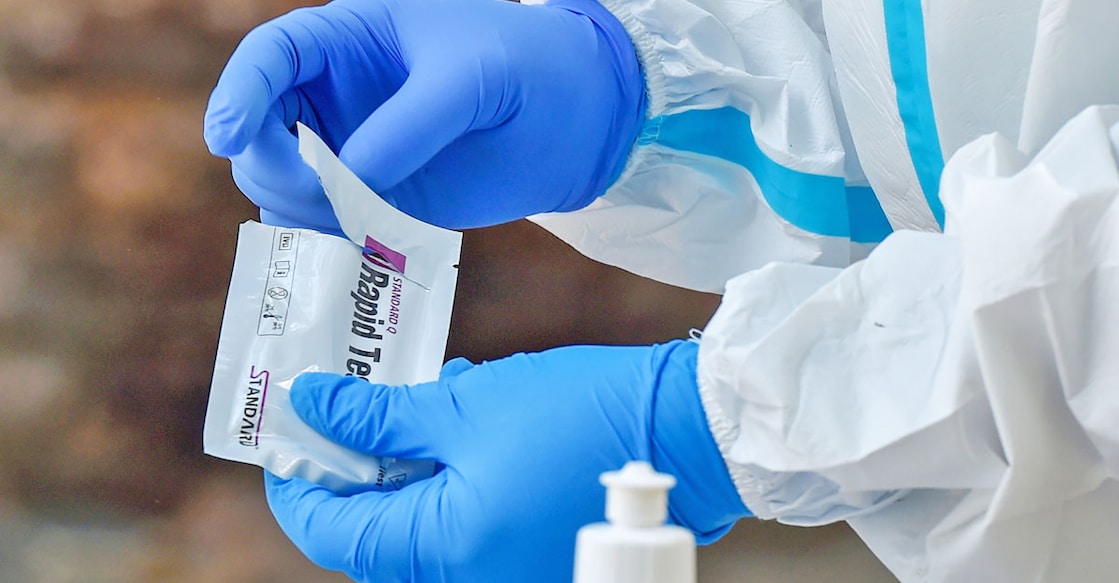Are rapid antigen tests masking Kerala's COVID-19 numbers

The Rapid antigen test kits Kerala has sourced from Korea have a test sensitivity of only 30 percent, the manufacturers themselves have said.
The Rapid antigen test kits Kerala has sourced from Korea have a test sensitivity of only 30 percent, the manufacturers themselves have said.
The Rapid antigen test kits Kerala has sourced from Korea have a test sensitivity of only 30 percent, the manufacturers themselves have said.
The Kerala government is working towards ramping up COVID-19 tests in the belief that identifying hidden clusters and spotting vulnerable pockets before a surge can happen are the only ways to put brakes on the COVID-19 spread.
The worry is, by depending on a diagnostic tool with relatively low test sensitivity like rapid antigen test (RAT) to vastly increase testing, a large number of positive cases could be escaping Kerala's surveillance radar.
Test sensitivity is the ability of a tool to accurately call out the infected. The RAT kits Kerala has sourced from Korea have a test sensitivity of only 30 percent, the manufacturers themselves have said.
Fifty-fifty
However, top health officials say the RAT kits are performing far better than anticipated. "We can easily say it has a sensitivity of 50 per cent," a senior health official, who is part of the COVID Expert Committee, said.
Even if this is accepted, it still means that there is only a half chance of a RAT test throwing up a 'true negative result'. To put it differently, even if a sample is negative there is a 50 percent chance of it being positive.
Since August, over 70 per cent of samples taken daily are tested using RAT kits. This would further mean that there is an inherent uncertainty in the case of at least half the daily results.
Nonetheless, a RAT test will not throw up a 'false positive' as the specificity of rapid antigen is as high as Reverse Transcription - Polymerase Chain Reaction (RT-PCR).
In other words, a RAT positive, unlike a RAT negative, is bullseye.
Negative questions
To make up for this 'negative uncertainty', the globally accepted norm is to validate a RAT negative by doing a confirmatory RT-PCR test.
This, according to the government, is impractical. "It is not possible to do costly confirmatory RT-PCR tests on thousands who test negative daily," a senior health official said on condition of anonymity.
The official said that confirmation was not even required in many cases.
"Asymptomatic people, for instance. Or those who have no links to confirmed cases but had been randomly selected for testing. There is no point in doubting their negative status,” he said. "But a primary contact with symptoms who had tested negative in a RAT test will definitely be subjected to a confirmatory test," he added.
But asymptomatic and mildly symptomatic primary contacts who are RAT negative, even in COVID clusters, are told only to undergo the mandatory 14-day quarantine. RT-PCR will be done only if they show any symptoms.
Need for confirmation
However, health officials Onmanorama talked to conceded that the testing in Kerala was now so focussed that almost all the candidates now picked for testing belonged to the high-risk category (primary contacts, cluster residents, symptomatics and the elderly with underlying morbidities.)
"Not to validate their negative status can be disastrous," a top community medicine expert said. "Most of the people who are now tested are the ones found within highly vulnerable situations and their negative status, on the face of it, should be viewed with suspicion,"
Early tests for best results
Waiting for symptoms to erupt to do the confirmatory test is also considered unacceptable globally.
The United States of America's Centers for Disease Control and Prevention (CDC), whose COVID-19 guidelines set the standard for the world including the ICMR, had on September 5 said the time interval between collection of samples for the two tests (the RAT test and its validation) should be less than two days.
This is to narrow the chances for new exposures. Any test done after two days, the CDC says, is not a confirmatory test but a new one.
Also, RAT will be effective only if done early because the test is not good enough to pick up signals from antigens in specimens collected after 5-7 days of the onset of symptoms. Therefore, a late RAT could also result in a negative test result.
Why RAT is inevitable
The low level of confirmatory tests in Kerala is more a handicap imposed by the urgency of the situation than a governance failure.
If tests have to cross 50,000 a day, RAT is the only way out.
It is the most cost-effective diagnostic tool. An RT-PCR test costs Rs 2,750. CBNAAT is Rs 3,000. TRUNAT is Rs 1,500 for one stage. But an antigen test costs just Rs 625.
There is no need for highly skilled technicians to do a RAT test, like in the case of RT-PCR tests. It has rapid turnaround time, too. The results are available within 30 minutes.
"It is a boon for COVID management," said Dr K P Aravindan, one of Kerala's most reputed pathologists and a member of the COVID Expert Committee.
"By testing more people we are clearly detecting more infected. Though some positive cases would inevitably be missed, the large number of tests made possible by RAT and the positives they throw up will eventually cancel out the misses," Dr Aravindan said.

